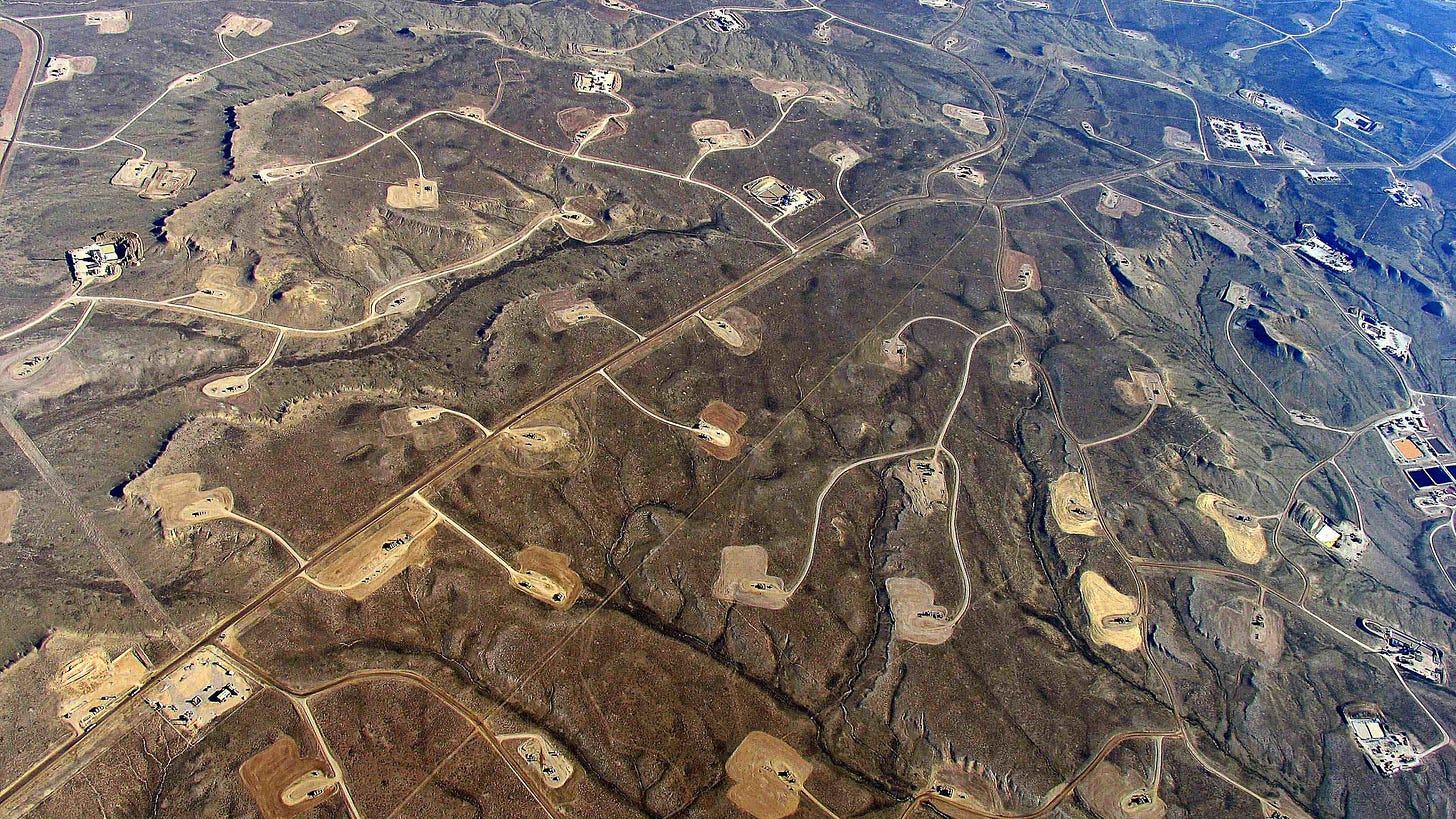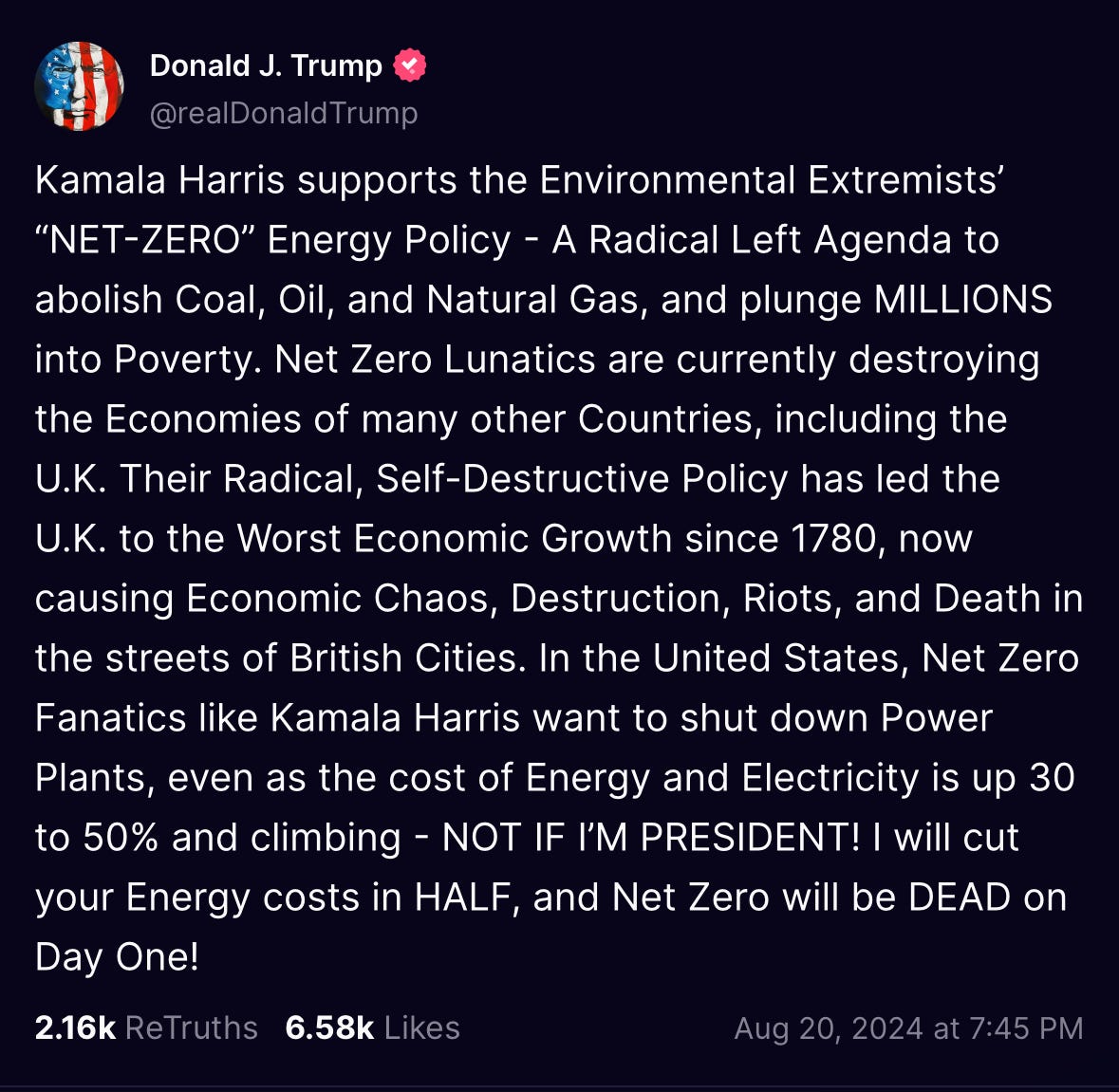Why Harris v Trump is the Everything-But-Climate Election
The 2024 US Presidential election could have dramatic consequences for global climate action, so why has championing the fossil fuel industry become common ground for Harris and Trump?

My last post to The Donkey Vote - written in the immediate wake of the attempted assassination of Donald Trump - lamented the likely inflow of sympathy and resources that Trump would be able to leverage to strengthen his campaign for President for the remaining months until 5 November. That certainly is what appeared to be happening - with Trump amassing donations and a bump in the polls - until the withdrawal of Joe Biden as the Democratic candidate.
The wave of Democratic enthusiasm that Kamala Harris now rides has transformed the Presidential race. Harris now commands a slight edge in the polling, but after being burnt by the polls in 2016, the Democrats are expressing optimism but not complacency.
Despite the magnitude of possible ramifications that could emerge from this election, the greatest issue of our time - the as-yet unmitigated global climate crisis - has remained relegated to a low priority issue by both candidates and voters alike.
Immigration, the cost of living, women’s rights, the preservation of the integrity of democratic institutions, and basic questions about Trump’s competency all dominate the current election discourse. These aren’t unworthy issues - they should all be a core focus of the election debate - but given the stakes climate change should feature just as prominently.
Polling of the most important issues for voters consistently shows climate change as a low priority issue for voters. While a majority say climate change is an important issue, this is heavily skewed towards Democratic voters, and even few Democrats rate it as a top priority. This was true even in a Harvard University poll of voters aged under 30.
The deprioritisation of climate change as an election issue reflects multiple factors; voters are worried about the economy and their sense of ‘security’ more broadly. It’s also not an area of policy competition between Harris and Trump.
The recent Harris-Trump debate provided our first face-to-face encounter between the two candidates. Much of the subsequent analysis has focused on Trump’s bizarre assertions that immigrants are eating their neighbour’s dogs in Springfield, Ohio, and how Trump allowed himself to be bated by Harris’ not-so-subtle trolling on matters like his rally attendance. Refer to Australia’s own Jonathan Swan’s analysis in the NY Times for a great breakdown of Harris’ baiting.
However, there has been little critique of the unsatisfactory answers provided by both sides on the issue of climate change.
Firstly, it’s worth acknowledging that there’s clearly a Grand Canyon-sized chasm between the two candidates when it comes to their acceptance of climate change as an issue and the support they promise to provide to clean energy technologies.
We know where Trump stands on climate change because we saw what he did during his first term as President. He withdrew the United States from the Paris Agreement and removed federal regulations that imposed limits on greenhouse gas emissions from power stations, cars, and oil and gas production. Trump also stacked a US Supreme Court with jurists who have since neutered the federal Environmental Protection Agency from pro-actively regulating greenhouse gas emissions.
In contrast, Harris has been unequivocal in her recognition that climate change is a real and growing danger, and during the recent presidential debate, she pointed to the track record of the Biden-Harris administration in implementing measures like the Inflation Reduction Act, which will direct $783 billion into clean energy projects.
But, there is an incongruity in Harris’ climate and energy policies.
This is what Harris said when a question about climate change was finally asked very late into the debate:
“What we know is that [climate change] is very real. You ask anyone who lives in a state who has experienced these extreme weather occurrences who now is either being denied home insurance or is being jacked up. You ask anybody who has been the victim of what that means in terms of losing their home, having nowhere to go. We know that we can actually deal with this issue. The young people of America care deeply about this issue. And I am proud that as vice president over the last four years, we have invested a trillion dollars in a clean energy economy while we have also increased domestic gas production to historic levels.”
- Kamala Harris, Presidential debate (September 10, 2024)
The last sentence is the kicker that has flavoured so much of the Democratic candidate’s approach to the climate issue. Earlier in the same debate, Harris proudly pointed to her history of supporting the expansion of the American oil and gas industries.
“I will not ban fracking. I have not banned fracking as Vice President of the United States. And, in fact, I was the tie-breaking vote on the Inflation Reduction Act, which opened new leases for fracking. My position is that we have got to invest in diverse sources of energy so we reduce our reliance on foreign oil. We have had the largest increase in domestic oil production in history because of an approach that recognizes that we cannot over rely on foreign oil.”
- Kamala Harris, Presidential debate (September 10, 2024)
Evidently, committing to the phase out of fossil fuels is a lower priority for the Harris campaign than being seen to support new job creation and addressing energy security. Climate action takes a back seat to the issues of most importance to those in swing states.
Harris has not only backed away from an earlier position that supported a ban on fracking, but has openly supported and championed the growth of American fossil fuel industries. “The largest increase in domestic oil production in history” is part of the Biden-Harris legacy that she is selling to voters.
Those who will defend Harris’ approach argue that winning the presidency is the most important objective. Take, for example, the response from the Sierra Club - one of the world’s oldest environment groups - which issued an emphatic endorsement of Kamala Harris’ climate policy platform.
A second Trump presidency would be - by far - disastrous for climate action. That’s not untrue.

But, it is important to note the broad range of environmental impacts of fracking. An obvious impact is that it facilitates the growth of fossil fuel use. In its landmark Net Zero by 2050 pathway, the International Energy Agency stressed that - starting from 2021 - there could be “no new oil and gas fields approved for development”. More fracking is incompatible with that net zero by 2050 pathway.
Fracking is also much more than just a climate issue. The practice of fracking involves the injection of chemicals and other materials deep underground to deliberately trigger the breakup of sediment structures and release trapped gas. Due to the significant contamination risk, it is a threat to the health of nature and human populations alike. Fracking has a significant impact on land, poses a significant risk to the safety of drinking water supplies, and produces air pollution that is a direct threat to the health of nearby human populations.
If the underlying issues that matter to voters in swing states are indeed new job opportunities, lowering energy costs and reducing dependence on foreign supplies of oil and gas - then truly clean energy technologies (not gas) can achieve all of these objectives without the need for more fracking. Harris needs to have the confidence to make that pitch to voters rather than an unseemly embrace of a larger fossil fuel industry.
For the record, Trump’s response to the ‘climate question’ during the debate strayed into the assertion that he would stop Mexican-made, Chinese-owned automakers from selling cars in the United States. It was a response about jobs and protectionism and did not address climate as an issue.
Trump touched on clean energy at other points in the debate, including when he criticised solar energy projects for taking up too much land. In the desert.
“If she won the election, the day after that election, they'll go back to destroying our country and oil will be dead, fossil fuel will be dead. We'll go back to windmills and we'll go back to solar, where they need a whole desert to get some energy to come out. You ever see a solar plant? By the way, I'm a big fan of solar. But they take 400, 500 acres of desert soil. These are not good things for the environment that she understands.”
- Donald Trump, Presidential debate (September 10, 2024)
We’re left with an election that has relegated climate change to being a low-priority issue. Harris has not sought to capitalise on Trump’s conspiratorial opinions about clean energy technologies and his claims that climate action is some woke-agenda hoax. Instead, Harris has worked to minimise the perception that she may seek to diminish American fossil fuel industries to avoid upsetting crucial voters in swing states like Pennsylvania.
Even after a change in candidate, the stakes at risk in this election are very high. On one side, we have an experienced, qualified, and competent Democratic candidate who is campaigning on a platform that promises to save democratic institutions and offers a positive vision for the future. On the other side, we have Trump’s promises of an upheaval of institutions and retribution against his enemies - whether he wins or loses.
Trump also risks dragging other countries into climate inaction. Australia is an obvious example of this risk. A Trump Presidency would provide licence to a possible Dutton-led future Australian Government (after the next Australian federal election) to join the United States in winding back investment in clean energy alternatives and abandon international agreements.
It represents the unsatisfactory bargain that the American climate movement has had to make. It must support a candidate that celebrates fracking and the growth of a domestic fossil fuel industry because the alternative is Donald Trump.



